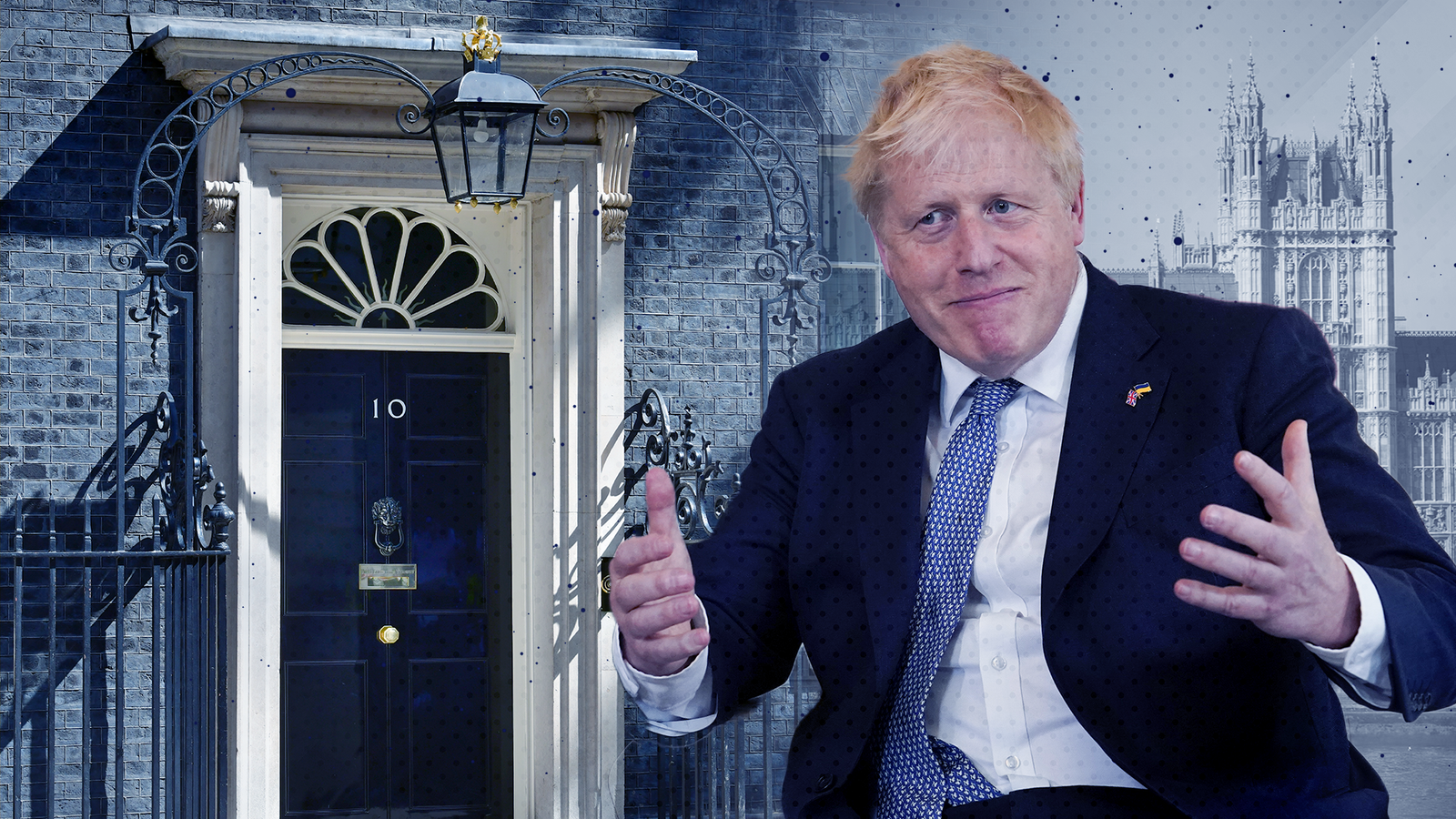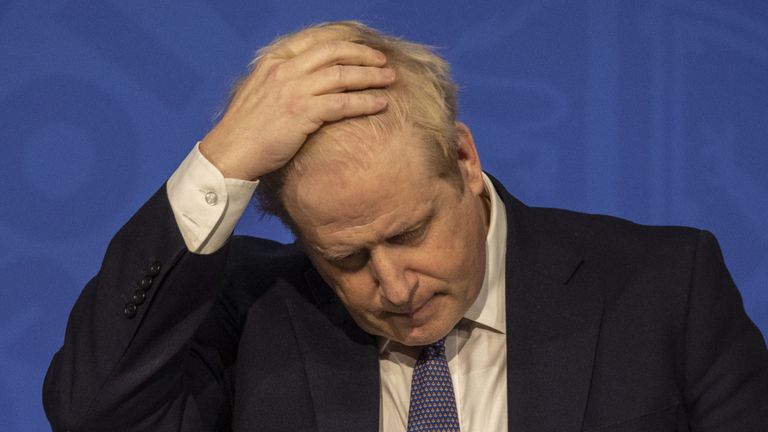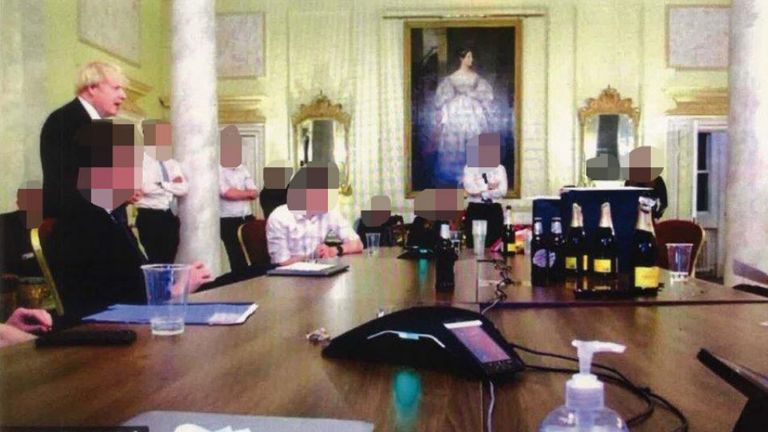Love him or hate him, everyone knows that Boris Johnson thrives on being the centre of attention.
Next Wednesday afternoon from 2pm the former prime minister will be back in the spotlight at Westminster for a high stakes appearance, which is bound to be a popcorn moment for spectators.
Live on television, members of the cross-party privileges committee will question Mr Johnson for up to four hours on whether he deliberately lied when he told the House of Commons that he had no knowledge of rule-breaking parties in Number 10 during the COVID emergency period.
If the MPs conclude that he is guilty, they will recommend punishment which could lead to him losing his parliamentary seat representing Uxbridge – a calamity which would surely end the political career of a man who would be prime minister again.
Technically the MPs have to decide whether Mr Johnson committed contempt of the House by lying to it about the parties, and not correcting his words subsequently.
It is a trial by his peers.
First, the seven MPs on the privileges committee. Then, if punishment is recommended, the whole House of Commons will say whether to implement it.
The committee’s work has already caused ructions at Westminster.
Chris Bryant, the senior Labour MP who chaired it, stood aside, or rather “recused” himself as the jargon has it, because of previous outspoken criticisms of Mr Johnson.
MPs were reluctant to let the ranking Tory, the maverick Brexiteer Sir Bernard Jenkin take over, so Harriet Harman, the former Labour deputy leader was co-opted to take the chair.
Meanwhile two Conservatives on the committee, first time MP Andy Carter and Alberto Costa, quit minor posts in government to keep their place on it. The other members are Allan Dorans (SNP), Yvonne Fovargue (Labour), and Sir Charles Walker (Conservative). Four Conservatives gives them the majority on the seven member committee.
Taxpayers are paying for Mr Johnson to hire his own lawyers on behalf of the government.
Strong circumstantial case against Mr Johnson
David Pannick, an independent member of the House of Lords, duly produced opinions that the committee’s actions are “very unsatisfactory” and “fundamentally flawed”.
His main argument was that the crux should be not whether Mr Johnson misled the House but whether there was “intention to mislead”.
Lord Pannick KC’s other clients include Sir Philip Green, Shamima Begum and Manchester City FC.
MPs are lawmakers who regulate their own affairs and they set aside Lord Pannick’s argument.
Nonetheless, Mr Johnson’s intentions in making the statements he did will be flashpoints during his grilling next week.
There is a strong circumstantial case against Mr Johnson. He repeatedly denied any knowledge of parties and rule breaking during the COVID restriction periods in 2020 and 2021, even though he had announced many of the regulations himself.
He subsequently accepted a fixed penalty notice from the Metropolitan Police, and paid a fine for attending a party on his birthday.
Like the Sue Gray report into partygate before it, the pre-hearing interim report from the privileges committee this month cites “evidence that a culture of drinking in the workplace in some parts of No 10 continued after the COVID restrictions began” including “birthday parties and leaving parties for officials”.
The committee’s report contains photographs which show more booze and crowding than the pictures released by Ms Gray.
Read more:
Boris Johnson re-selected to run in Uxbridge at next general election after suggestions of safer seat
Top civil servant warned Boris Johnson was ‘distrusted figure’ during COVID pandemic
Yet when Mr Johnson was questioned about the parties in the Commons after the stories broke in the media in the closing months of 2021 he repeatedly denied them.
On 1 December 2021 he told the House: “All guidance was followed completely in Number 10.”
On 8 December he stated: “The guidance was followed and the rules were followed at all times… I have been repeatedly assured since these allegations emerged that there was no party and no COVID rules were broken.”
Committee wants answers on four points
The committee’s interim report amounts to a rap sheet he will face.
The committee wants answers on four points.
Did Mr Johnson mislead, i.e. lie, when he said “No rules were broken” and that he had “no knowledge of gatherings”?
Was he truthful when he said he needed to rely on assurances of officials that no rules had been broken and that he needed to wait for Sue Gray’s report to find out whether rule-breaking parties had taken place?
The committee has taken written evidence from 23 people involved and has already concluded “breaches of [COVID] guidance would have been obvious to Mr Johnson at the time he was at the gatherings”.
Lying is a very delicate subject at Westminster. Many members of the public may think it is what politicians do all the time. But accusations of lying are officially designated “unparliamentary language”, and no MP is allowed to directly accuse another of doing so.
Click to subscribe to the Sky News Daily wherever you get your podcasts
The assumption is that no “honourable or right honourable” member would lie and that if they inadvertently tell a falsehood, they will correct the official record.
In recent times, government ministers have corrected their statements in Hansard more than one hundred times a year.
Former PM will be playing to the dwindling band of Boris-loyalist politicians
No one knows how tough the questioning will be on Wednesday or how Mr Johnson will react to it.
His lifelong tactic when in a tight spot is to flatter his audience and try to make a performative joke of it.
As his admiring father Stanley reminisced it worked in the school play at Eton: “Boris was playing the title role. It was fairly obvious that he hadn’t learnt the part, but he winged it splendidly, inventing on the hoof a sequence of nearly perfect Shakespearean pentameters.”
Mr Johnson’s appearances before more demanding audiences have gone less well.
Asked if he was a habitual liar, he could only bluster “I don’t agree with that conclusion”.
He was forced to stand down as prime minister last summer shortly after a member of the Liaison Committee of MPs told him bluntly “the game is up”.
Sir Max Hastings, who boosted Mr Johnson when he was working for him at The Daily Telegraph now abominates him.
He has remarked: “Those who know Boris best like him least.”
Mr Johnson has never been “a House of Commons man” but MPs cannot fail to know him well by now.
However he is treated by the committee, Mr Johnson will be playing to the dwindling band of Boris-loyalist politicians and party members and his champions in the Tory media, who are already claiming that he was brought down unjustly by a partisan left-wing conspiracy.
Unlike Mr Johnson, who catastrophically tried to use the whip on his MPs to save his friend Owen Patterson from a 30-day suspension for corruption, Rishi Sunak has said he will not interfere.
Mr Johnson’s fate may well hang on which way Conservative MPs jump, on the committee and afterwards in the whole House.
The psephologist Peter Kellner has a single word of advice for those Conservatives hankering to bring back Boris: “don’t” – in their own interest.
Inquiry unlikely drive the stake through the heart of Mr Johnson’s political career
Analysing an opinion poll by Delta, Mr Kellner points out that Mr Johnson is more unpopular with the public than either Mr Sunak or Sir Keir Starmer, and just as disliked as the lowly ranked Conservative Party, meaning he would bring no bounce with him.
All the same, the chances must be low that the lying inquiry will finally drive the stake through the heart of Mr Johnson’s political career via the Recall of MPs Act, which was introduced by David Cameron.
First the committee would have to recommend a suspension of more than 10 sitting days as punishment, then it would need to be endorsed by a majority in the House. Only then would a recall petition have to take place in his constituency. Next, 10% of the electorate in Uxbridge would have to sign it, to kick him out and force a by-election.
That sequence is a tall order.
The betting has to be that “the greased piglet”, as David Cameron called him, will slip past his political slaughtermen again and carry on drawing attention to himself.



